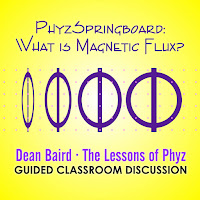Right hand rules in high school physics do not bring me great joy. I cringed when The Physics Teacher ran a photoessay from an instructor who photographed students contorting hands during an exam. (A cursory search for this article was unsuccessful. I hope it was expunged.)
Nevertheless, 3-D geometry cannot be avoided when studying magnetic fields and forces. In the Ørsted's discovery lab, students develop a right hand rule relating to current and the magnetic field it produces. That was Right Hand Rule #1.
This activity relates current, external magnetic field, and magnetic force. Right Hand Rule #2.
Just an exercise in exercising the right hand rule of your preference. After a few simple scenarios, things get a bit more interesting and the last one is quite open-ended.
We move from the Lorentz force to a derivation of V = BLv step by step. Tangential, peripheral references to an ancient Monty Python sketch can be found, but need not be appreciated.
Sometimes textbooks jump into flux a bit hastily. So I produced this lesson to build the concept by analogy to wind blowing through a window. "Air flux" is more intuitive, and offers a path toward understanding magnetic flux.
Once flux is on board, developing Faraday's Law of Electromagnetic Induction can be attempted. The derivation is taken one step at a time, but we eventually get there. The core of Faraday's law is that the voltage induced in a loop is the rate at which flux changes. The "–" and the "N" in the equation serve a purpose, but are not central to the application of Faraday's law.
All of these have been added to A Bundle of Phyz: ELECTROMAGNETISM.





No comments:
Post a Comment